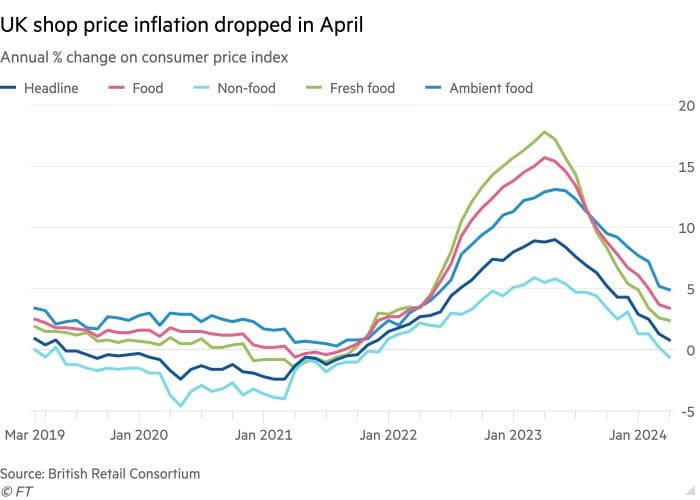Retail data recently showed that non-food prices in UK stores fell annually for the first time since 2021, bringing overall shop inflation below 1%, easing the burden of rising living costs on consumers.
According to a report published by the BRC on Tuesday, annual market price inflation fell to 0.8% this month from 1.3% in March, the lowest level since December 2021.
Non-food goods saw deflation of minus 0.6% in April, which the trade association partly attributed to retailer promotions. This was the lowest deflation since October 2021 and the first deflation since December 2021. The index rose by 0.2% in March.
“One year on from the peak, shop price inflation levels are showing signs of normalising, providing relief to households. Both food and non-food have seen shop inflation rates ease to more manageable levels.” said Helen Dickinson, Chief Executive of the British Retail Consortium.
Retail Inflation Drops Amid Political Discussions
The official measure of consumer price inflation, which unlike the BRC index excludes services, energy and travel, hit a two-and-a-half year low of 3.2% in March.
In addition, following the lowering of the price cap declared by the regulator, the Office of Gas and Electricity Markets (OGEM), in February, economists interviewed by Reuters predicted that the energy price cap would fall below the Bank of England’s 2% target in the second quarter of this year.
On top of growing pressure from the Conservatives to cut interest rates before the next Monetary Policy Committee meeting in May, the Bank of England is facing an internal debate over when it will cut interest rates from 5.25% to 2.5%.
According to the BRC, food inflation fell to 3.4% in April from 3.7% in March, the lowest level since March 2022.
The State Chancellor, Jeremy Hunt, has spoken on several occasions of the prospect of spending cuts in order to improve the economic situation prior to this year’s general election.
In fact, prices for fresh produce rose by just 2.4% in April, the smallest increase since November 2021, and prices for ambient products, which can be stored at room temperature, rose more slowly. The trade association says ambient food inflation fell to 4.9% in April, almost two years below its peak.
Grocery costs are starting to stabilise and, compared to a year ago, many non-food items are now cheaper, which is ‘good news for consumers’, according to Mike Watkins, head of retail and business development at research company NielsenIQ, who helped compile the data.
‘To help consumers manage their household budgets, retailers are continuing to run promotions, which provide additional savings and should continue to boost overall demand,’ he added.










